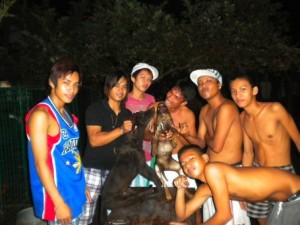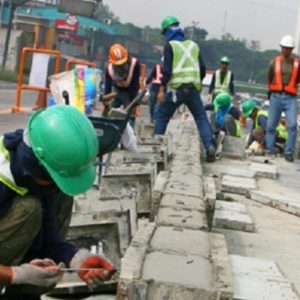Continuing to send Filipino workers overseas to seek and sustain employment is a serious misallocation of human capital. Much the same way as wanton mining in the Philippine countryside took a huge toll on the environment and landscape, exporting people leaves deep scars in the Philipines’ social fabric.
And so, here is why the OFW issue, the mining thing, and the much-misrepresented “war on drugs” are important pieces in the puzzle of sustaining the stellar economic growth the Philippines is currently in the midst of.
There is an emerging coherent backdrop to the stated intent of the government of Philippine President Rodrigo Duterte to invest heavily in infrastructure development to sustain economic growth. The Financial Times reports that the Duterte government will spend up to $160 billion to make good on that plan. The need to uplift the Philippines’ decrepit infrastructure is a no-brainer. Successive administrations have been measured on how much visible infrastructural wonders they have respectively delivered and left as lasting legacies.

The less-evident most often-neglected but equally important imperative for any government is to ensure that the deeper foundations upon which this infrastructure is built and employed is secured as well. Indeed, to achieve the ambitious goal of becoming a high-income economy by 2040, “the Philippines needs to raise total investments from the hoped-for 24% this year to 30% of GDP, of which only 7% would be contributed by the public sector,” according to Dan Steinbock, an expert on the risk profiles of key emerging economies. To achieve that goal not only involves building new things, it also involves ensuring that existing things do not degrade and lose value. After all, gains brought about by investment on new things would be offset by the effects of neglecting the old stuff.
At present, there already is a high-profile initiative to secure the Philippines’ landscape and environment from any further degradation that, for decades, had been wrought by mining — a programme beingexecuted with zeal by Environment Secretary Gina Lopez.
The other one, Duterte’s famous (or, rather, infamous) “war on drugs” seeks to eradicate a social cancer that has, for so long, been left to fester and not only terrorise ordinary law-abiding Filipinos but degrade the core of the nation’s human capital base — its youth, its unemployed, and the idle offspring of its wealthy classes. As the cliché goes, in a society’s youth lies its future. Add to that its unemployed who have much to offer given the opportunity. And of those born with a silver spoon in their mouths who spend their days — and their inheritances — doing drugs? That’s capital that could have been invested but is, instead, being lost to the crime syndicates.
This brings us to the OFWs whose remittances account for up to 10% of the Philippine economy. Unfortunately, the damage left by OFW export is the social equivalent of the damage left by mining and raw export of minerals. For both, the scars are permanent. An entire generation of Filipino kids grow up under sub-optimal conditions — remotely-parented by an entire generation of OFW adults. While the tangible cash contribution to the economy of OFWs is much-celebrated, the cost of this windfall is consistently obscured by layers of ill-thought-out rationalisation.
Back in 2008, then United Nations International Children’s Fund (UNICEF) deputy country representative Colin Davisstressed the “social cost of migration” and how its “painful effects are beyond measure and must be analyzed critically at the policy level.” Perhaps Duterte could be regarded as the first Filipino president who made an intent to reverse the tide of OFWs quite explicit. In a speech delivered to the Filipino community in Tokyo during an official visit there, Duterte vowed that “the next generation of Filipinos will not be overseas workers”. This represents a decisive departure from previous governments’ reliance on the low-hanging fruit that is OFW remittances to sustain a significant chunk of the national economy.

The way forward, in short, is sustained development driven by expansion of the domestic capital base funded by a healthy stream of foreign and domestic investment. The domestic capital base is capital that is firmly committed — i.e., largely fixed and, as such, in for the long-haul; like factories, domestic expertise and skills, and, of course, physical infrastructure. Consumption should be fueled increasingly by employment created by that domestic capital base and progressively less by OFW remittances.
As far as we have so far observed, the Duterte government is focusing on the hard problem of building that foundation and investing on the infrastructure on top of that foundation. This has come at the cost of sustained attack from entrenched oligarchic interests — mining firms, retailers and mall operators, trash entertainment producers, casino operators, telecoms firms, and, yes, the drug syndicates; big business interests that feed off easy OFW cash. Because these big firms exert vast thought leadership (thanks to their mega-million-funded brands, media presence and cheesy viral video advertisements), the “disente” crowd with their access to expensive media consumption devices are easy preyto clever marketing and its payload of flawed “thought leadership”.
As the saying goes…
If you are not pissing somebody off, you are probably not doing anything important.
* * *
Epilogue:
It is quite evident that the so-called “disente” crowd is pissed off with the way President Duterte is going about his business. The best perspective to take when regarding this quaint annoyance is to see whether they could come up with not just better ways of doing things but different ways of doings things. After all, insanity is characterised by an expectation that different results will be seen whilst doing the same things over and over again.


No comments:
Post a Comment